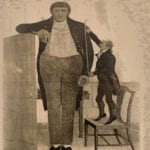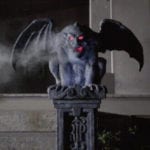 Our World
Our World  Our World
Our World  Crime
Crime 10 Dark Details of the “Bodies in the Barrels” Murders
 Animals
Animals The Animal Kingdom’s 10 Greatest Dance Moves
 Movies and TV
Movies and TV 10 Box Office Bombs That We Should Have Predicted in 2025
 History
History 10 Extreme Laws That Tried to Engineer Society
 History
History 10 “Modern” Problems with Surprising Historical Analogs
 Health
Health 10 Everyday Activities That Secretly Alter Consciousness
 History
History Top 10 Historical Disasters Caused by Someone Calling in Sick
 Animals
Animals 10 New Shark Secrets That Recently Dropped
 Movies and TV
Movies and TV 10 Forgotten Realities of Early Live Television Broadcasts
 Our World
Our World 10 Places with Geological Features That Shouldn’t Exist
 Crime
Crime 10 Dark Details of the “Bodies in the Barrels” Murders
 Animals
Animals The Animal Kingdom’s 10 Greatest Dance Moves
Who's Behind Listverse?

Jamie Frater
Head Editor
Jamie founded Listverse due to an insatiable desire to share fascinating, obscure, and bizarre facts. He has been a guest speaker on numerous national radio and television stations and is a five time published author.
More About Us Movies and TV
Movies and TV 10 Box Office Bombs That We Should Have Predicted in 2025
 History
History 10 Extreme Laws That Tried to Engineer Society
 History
History 10 “Modern” Problems with Surprising Historical Analogs
 Health
Health 10 Everyday Activities That Secretly Alter Consciousness
 History
History Top 10 Historical Disasters Caused by Someone Calling in Sick
 Animals
Animals 10 New Shark Secrets That Recently Dropped
 Movies and TV
Movies and TV 10 Forgotten Realities of Early Live Television Broadcasts
10 Real Life Werewolves
There are many stories about werewolves or lycanthropy. Little Red Riding Hood and the wolf that could mysteriously talk. An American Werewolf in London. Being Human. All STORIES of talking, walking, hungry wolf-men. But has any one really thought if this is actually a real case? I am here to tell you about 10 interesting and weirdly scary cases of real lycanthropy…
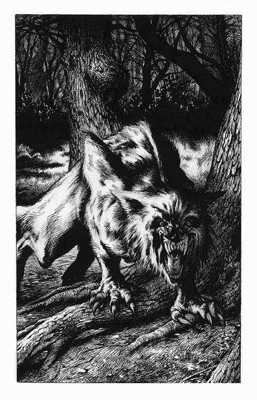
In the sixteenth century town of Dole, a proclamation was publicly read in the town square. Its contents gave permission for the people to track down and kill a werewolf that had been terrorizing the village.
While walking through the forest, a group of peasants heard the screams of a small child accompanied by the howling of a wolf. When they arrived they saw a wounded child fighting off a monstrous creature whom they later identified as Gilles Garnier. When a ten year-old boy disappeared in the vicinity of Garnier’s home, he was arrested and confessed to being a werewolf. He was then burned at the stake. Wikipedia has a few more details on this werewolf here.

According to old records, c. 1640, the German city of Greifswald became overrun with werewolves. The population of these beasts grew so large that any human who ventured out after dark was in danger of being accosted by one of them.
A group of students decided that they had had enough and devised a plan. They gathered all their silver goblets, plates, buttons, etc., and melted them down for bullets.
Armed and ready – they struck out into the night to challenge the werewolves. After it was over, the people of Greifswald, once again could venture out at night.
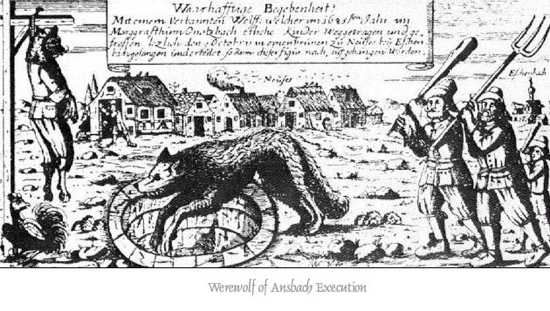
In 1685 the Bavarian town of Ansbach was being terrorized by a large vicious wolf. The rumors were that the wolf was actually a werewolf whose identity was that of the town’s dead mayor. When the wolf was killed, the people of Ansbach dressed the wolf’s carcass to resemble their mayor. It was then put on display in the town square and later moved to a museum.
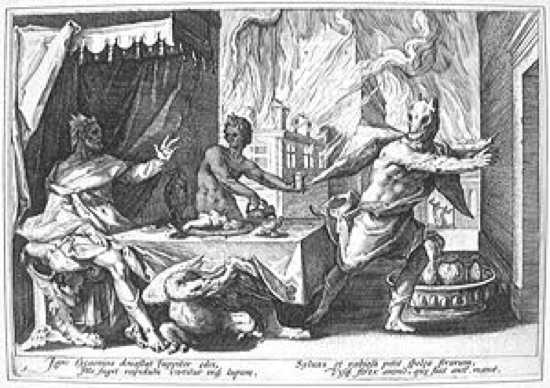
In earlier times there were extensive forests rich with game in the vicinity of Klein-Krams, near Ludwigslust, Germany. Great hunts were held in the area by sportsmen who came from all over Germany to test their prowess at bringing down their choice of game. For years, however, the hunters had been stymied by the appearance of a great wolf that seemed impervious to any bullet. Sometimes the beast would taunt them by approaching within easy shooting distance, on occasion even adding to the mockery by snatching a piece of their kill, then dash away without a bullet seeming to come anywhere near it.
Now it happened during one great hunt that one of the participants, a young cavalry officer, was traveling through the village when his attention was captured by a group running and screaming out of a house. Seeing nothing pursuing them that would cause such panic, he stopped one of the youngsters and asked what the matter was. The child told him that no adult from the Feeg family was at home except for their young son. When he was left alone, it was his custom to transform himself into a werewolf and terrorize the neighborhood children. They all ran away when he achieved such a transformation because they didn’t want him to bite them.
The officer was bemused by such wild play of the children’s imaginations, that he assumed they were playing the big bad wolf after the sheep or some game. But then he caught a glimpse of a wolf in the house, and in the next few moments, a small boy stood in its place.
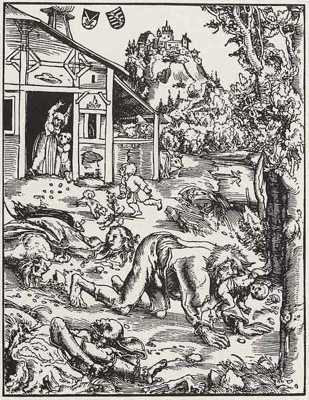
In 1541, Pavia, Italy, a farmer… as a wolf, fell upon many men in the open country and tore them to pieces. After much trouble the maniac was caught, and he then assured his captors that the only difference which existed between himself and a natural wolf, was that in a true wolf the hair grew outward, whilst in him it struck inward. In order to put this assertion to the proof, the magistrates, themselves most certainly cruel and bloodthirsty wolves, cut off his arms and legs. The wretch died of the mutilation.
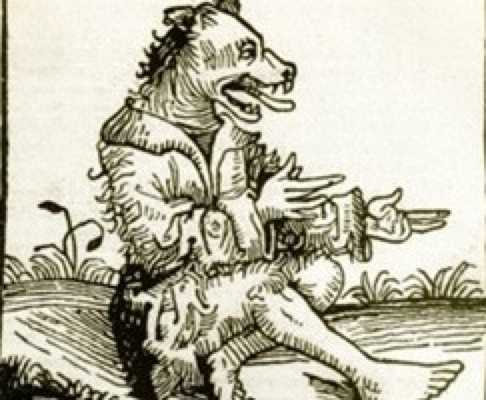
One of the worst-ever lycanthropes was the Werewolf of Chalons, otherwise known as the Demon Tailor. He was arraigned in Paris on 14 December 1598 on murder charges which were so appalling that the court ordered all documents of the hearing to be destroyed. Even his real name has become lost in history.
Burnt to death for his crimes, he was believed to decoy children of both sexes into his shop, and having abused them he would slice their throats and then powder and dress their bodies, jointing them as a butcher cuts up meat. In the twilight, under the shape of a wolf, he roamed the woods to leap out on stray passers-by and tear their throats to shreds. Barrels of bleached bones were found concealed in his cellars as well as other foul and hideous things. He died (it was said) unrepentant and blaspheming.
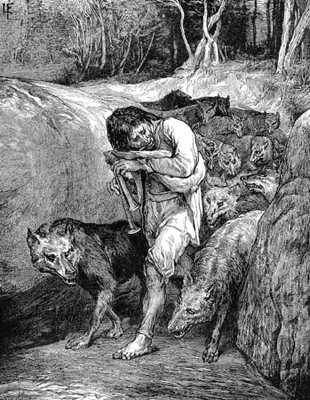
Claudia Gaillard was one of the hundreds of unfortunate souls brought to trial by the witch-finder Henry Boguet. According to witnesses, she was seen behind a bush assuming the form of a wolf without a tail. For this great sin, she was set to the torture. Regarding the tortures, the judge commented, “Common report was against her. No one ever saw her shed a single tear, whatever effort might be made to cause her to shed tears.” Claudia was then burned to death at the stake.
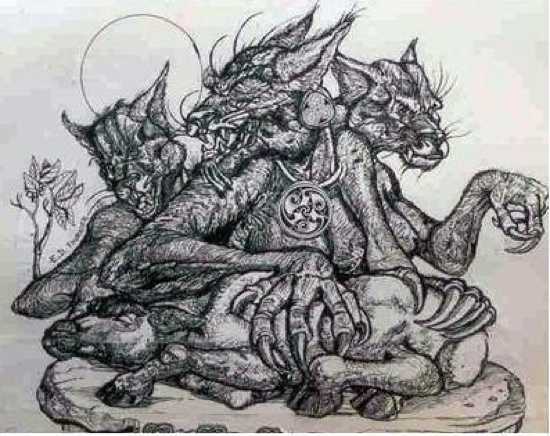
In 1521, Jean Boin, Inquisitor of Besancon, tried Philibert Montot, Pierre Bourgot, and Michel Verdun for having made a pact with the devil and for lycanthropy. These men became known as the werewolves of Poligny.
These men came under suspicion when a traveler passing through the area was attacked by a wolf. While defending himself, he was able to wound the animal, forcing it to retreat. Following the trail of the injured creature, the man came upon a hut where he found a local resident, Michel Verdun, under the care of his wife, who was washing a wound on his body. Believing Verdun’s injury to be a sympathetic wound, the man notified the authorities. Arrested and tortured, Verdun admitted that he was a shape-shifter. He also revealed the names of his two werewolf accomplices, as well as confessing to hideous crimes: diabolism, murder, and eating human flesh. The three men were promptly executed.

This case was tried in 1692, Jurgenburg, Livonia, situated in an area east of the Baltic Sea, steeped in werewolf folklore. It involved an 80 year-old man named Thiess.
Thiess confessed being a werewolf, saying his nose had been broken by a man named Skeistan, a witch who was dead at the time he had struck Thiess. According to Thiess’ testimony, Skeistan and other witches were preventing the crops of the area from growing. Their purpose for doing this was to carry the grain into hell. To help the crop to continue to grow, Thiess with a band of other werewolves descended into hell to fight the witches and recover the grain.
The warring of the werewolves and the witches occurred on three nights of the year: Saint Lucia, Pentecost and Saint John (the seasonal changes). If the werewolves were slow in their descent the witches would bar the gates of hell, and the crops, livestock, and even the fish catch would suffer. As weapons the werewolves carried iron bars while the witches used broom handles. Skeistan broke Theiss’ nose with a broom handle wrapped in a horse’s tail.
The judges were astounded by such testimony, for they had naturally supposed the werewolves were agents of the Devil. But now they were hearing the werewolves were fighting the Devil. When asked what became of the souls of the werewolves, Thiess said they went to heaven. He insisted werewolves were the “hounds of Gods” who helped mankind by preventing the Devil from carrying off the abundance of the earth. If it were not for them, all would suffer. He said there were werewolves in Germany and Russia also fighting witches in their own hells.
Thiess was determined in his confession, denying he had ever signed a pact with the Devil. He refused to see the parish priest who was sent for to chastise him, saying that he was a better man than any priest. He claimed he was neither the first nor the last man to become a werewolf in order to fight witches.
Finally the judges, probably out of desperation, sentenced Thiess to ten lashes for acts of idolatry and superstitious beliefs.
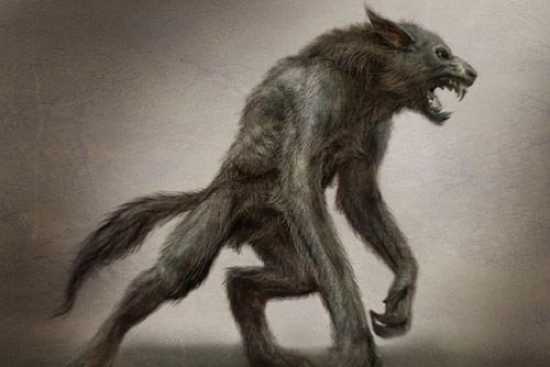
During the early spring of the year 1603 there spread through the St. Sever districts of Gascony in the extreme south-west of France, the department Landes, a veritable reign of terror. From a number of little hamlets and smaller villages young children had begun to mysteriously disappear off the fields and roads, and no trace could be discovered. In one instance even a babe was stolen from its cradle in a cottage whilst the mother had left it for a short space safe asleep, as she thought. People talked of wolves; others shook their heads and whispered something worse.
The consternation was at its height when the local magistrate advised the puisne Judge of the Barony de la Roche Chalais and de la Chatellenie that information had been laid before him by three witnesses, of whom one – a 13 year-old girl named Marguerite Poirier of the outlaying hamlet of St-Paul in the Parish of Esperons – swore that in full moon she had been attacked by a savage beast, much resembling a wolf. The girl stated that one midday whilst she was watching cattle, a wild beast with rufulous fur, not unlike a huge dog, rushed from the thicket and tore her kirtle with its sharp teeth. She only managed to save herself from being bitten thanks to the fact she was armed with a stout iron pointed staff with which she hardly warded herself. Moreover a lad of thirteen or fourteen years-old, Jean Grenier, was boasting that is was he who attacked Marguerite, as a wolf, and but for her stick he would have torn her limb from limb as he had already eaten three or four children.


